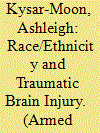| Srl | Item |
| 1 |
ID:
152323


|
|
|
|
|
| Summary/Abstract |
U.S. service women were exposed to more combat-related trauma in recent wars compared to prior conflicts and consequently faced an increased risk of trauma-related mental health outcomes. In this study, we examined gender by race differences in self-reported post-traumatic stress disorder (PTSD) symptoms and clinician diagnoses in a large sample of U.S. Black and White service men and women returning from Iraq and Afghanistan, to determine whether women overall and Black women in particular are at an increased risk of PTSD compared to Black and White men. Using three PTSD measures—two symptom-based measures assessed at different times and one diagnosis measure—we found more traumatic combat exposures were associated with higher PTSD risk for service women compared to service men, but there was no additional increase in risk of PTSD for Black females.
|
|
|
|
|
|
|
|
|
|
|
|
|
|
|
|
| 2 |
ID:
163581


|
|
|
|
|
| Summary/Abstract |
The authors examine racial/ethnic differences in screening positive for traumatic brain injury (TBI) and in diagnosis among service members upon returning from war in Afghanistan and Iraq. Using data from the Post-Deployment Health Assessment and Re-Assessment, and military health-care encounters from 2008 to 2009, they estimate logistic regressions in a sample of 46,488 service members. Hispanic and Asian service members do not differ from White service members in screening positive for TBI but have 19% and 33% lower odds of diagnosis, respectively. Compared to White service members, Black service members are less likely to screen positive for TBI immediately after deployment and about as likely 3–6 months later, yet have 27% lower odds of diagnosis. Further, racial/ethnic minority service members have a lower probability of TBI diagnosis than White service members at all self-reported symptom levels, suggesting there is a discrepancy between symptoms and diagnosis related to race/ethnicity.
|
|
|
|
|
|
|
|
|
|
|
|
|
|
|
|